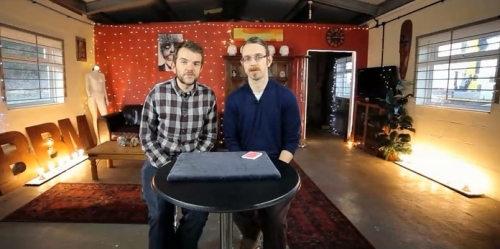Your position: Home / New arrival
This treatise is a compilation of Marlo's methods for performing a card-to-wallet, incorporating his Exclusive Card in Wallet (1961) with methods published in Ibidem, Hierophant, Card Finesse, Marlo's Magazine, and other previously unpublished but related methods. This material was discovered in a thick folder among Marlo's private effects.
The idea of causing a selection to disappear from the deck and then reappear elsewhere is almost as old as playing cards. Reinhard Müller has painstakingly researched the basic effect classified as "Card Found in Some Object," which was being performed (in some form) in the 17th century. For example, Müller discovered the effect, "Card in Mirror," in a book written in 1690 by Eberhard Welper. There are 58 pages of references ferreted out by Jack Potter and listed in The Master Index to Magic in Print.
Causing a card to magically travel to a purse is centuries old and Bart Whaley in his encyclopedia writes:
"The original version involving a stooge cued to miscall the card was exposed as early as 1790 and then by Gale in 1800, as 'The Card in the Pocket-book." This tired method was still being pushed as late as 1897 by Hercat under that same title. A new method (using a forced card and duplicate planted in the wallet) was probably invented by Professor Morris Loewy. In any case, it was first published by Hatton & Plate in 1910. Loewy taught it to S. Leo Horowitz. At this point, around 1918 (or so he recalled in 1956), 15-year old John Scarne created the modern method that involves a palm of the chosen (and signed) card and a gaffed wallet to receive it. He claims he publicly premiered this version during a 10-minute guest appearance on a Houdini show at the Roosevelt Theater in 1924 or 1925." Jerry Mentzer's Card to Wallet: The Book appeared in 1991 and today is the most accessible compilation to date. Mentzer explains most of the modern day methods, including the premiere versions using the three primary gaffed wallets by Le Paul, Himber-Bombshell, and Mullica.
Al Baker's method was first published by Bill McCaffery in the Sphinx (October - 1930). Scarne's later method, using the so-called Marlo Wedge, was published in 1938. In fact, the use of "guides" to facilitate the loading of a card is ancestrally tied to early tricks where purses or containers were nested. Over the years, various kinds of "guides" or "wedges" were used - everything from built-in leather flaps, plastic pieces, cardboard slides, coins, credit cards, and so on. Ed Balducci published a version with an enclosed note pad in Hugard's Magic Monthly (April - 1958). Keith Bennett replaced the note pad with a plastic guide for easier loading and marketed the "KB-Balducci Wallet" in Birmingham, England. Ed Marlo privately sold a wallet and manuscript (Exclusive Card in Wallet) in 1961 that used the "guide" idea, only in this case a coin was used to wedge and kept the wallet open for easy loading. Fred Kaps passed the idea to Ken Brooke in 1974. He put out (with credit to Balducci) "The Working Performer's Card in Wallet." The same year Emerson and West marketed "The Pocket Secretary," which was designed along the same lines.
Perhaps one day there will be another magnum opus devoted to the Card to Wallet theme. In the meantime, this foray may serve to spur your thinking and motivate you to play with the wallets in your possession.
[Please not that although Jon references photos in the ebook there are no photos included yet. We think that the text itself will be of interest and that is why we are releasing it as it is. At some point Jon intends to add the photos. When that happens all customers will be able to download the version with the photos.]
 USD
USD



